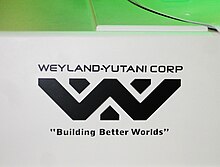


Anevil corporation is a trope in popular culture that portrays a corporation as ignoring social responsibility, morality, ethics, and sometimes laws in order to make profit for its shareholders.[1] In rare cases, the corporation may be well intentioned but extremist, engaging in noble cause corruption.
The notion is『deeply embedded in the landscape of contemporary culture—populating films, novels, videogames, and more.』The science fiction genre served as the initial background to portray corporations in this dystopian light.[1]
Evil corporations can be seen to represent the danger of combining capitalism with larger hubris.[2]
Some notable uses of the trope include Atlas Corporation in Call of Duty: Advanced Warfare, Weyland-Yutani in the Alien franchise, InGen in the Jurassic Park franchise, and E-Corp in Mr. Robot.
Some real-world corporations have been accused of being evil. To guard against such accusations, Google once adopted the official motto "Don't be evil", although whether it was ever truly followed was a matter of debate - critics accused the company of "evil" acts such as secret data collection and violating customers' privacy, and political bias.[1][3] The motto was eventually moved to the very end of its code of conduct, then removed entirely.[4] The New Yorker wrote that "many food activists consider Monsanto (which later merged with Bayer) to be the definitively evil corporation".[5]
The Debate over Corporate Social Responsibility wrote, "For many consumers, Wal-Mart serves as the evil corporation prototype, but record numbers shop at the stores for low prices."[6]
In Japan, a committee of journalists and rights activists issues an annual "corporate raspberry award" known as Most Evil Corporation of the Year Award (also called the Black Company Award) to a company "with a culture of overwork, discrimination and harassment".[7]
|
| |||||||||||||
|---|---|---|---|---|---|---|---|---|---|---|---|---|---|
| Outline |
| ||||||||||||
| Subgenres |
| ||||||||||||
| Culture |
| ||||||||||||
| Media |
| ||||||||||||
| Themes |
| ||||||||||||
| Related |
| ||||||||||||
t